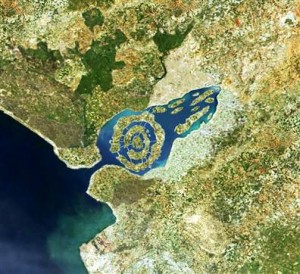 It is purely by chance that I discovered a remarkable note, penciled in a deliberate cursive, on page one hundred something of a secondhand copy of Borges’ Labyrinths. The Huns were clashing about and trampling books, but one survived—that sort of chance or magical thing—and an arrow crawled up from the text and declared “all great civilizations are built on marshes,” seemingly in praise for the despoiled monastery and its now collapsed civilization, or perhaps referring to the banks of the Danube or the arc of historiography that passed from Athens to Rome later in the page.
It is purely by chance that I discovered a remarkable note, penciled in a deliberate cursive, on page one hundred something of a secondhand copy of Borges’ Labyrinths. The Huns were clashing about and trampling books, but one survived—that sort of chance or magical thing—and an arrow crawled up from the text and declared “all great civilizations are built on marshes,” seemingly in praise for the despoiled monastery and its now collapsed civilization, or perhaps referring to the banks of the Danube or the arc of historiography that passed from Athens to Rome later in the page.
Regardless of the minutiae of the referents, the statement remained in my head for days as I shuffled about through my ordinary occupation and preoccupations with information theory, intelligent machines, and some spectral analysis of the statistical distribution of gut bacteria/eukaryotes. Google was fragmentary in its responses to the phrase as a query and I quit before the end of the first page, anyway, distracted by other thoughts about why marshes would be so attractive for building a civilization. The fishing should be good, admittedly, as well as the availability of reeds for various structures, but the shifting nature of land and the threat of mosquito infestation struck me as negatives. And wouldn’t clean, fresh water be better served by a mountain stream? All great cultures should be at the base of a non-volcanic snowpacked mountain.
I returned to Borges later in the week and found myself fanning through the pages like a schoolboy watching a stickfigure animation until, seventy-five pages further, below the tail of an essay on Cervantes and the inversion of authors and characters and readers, there was another brief flash off a curlicue of lead embedded in the page.… Read the rest